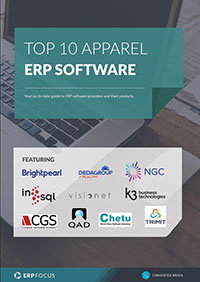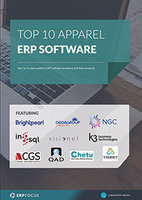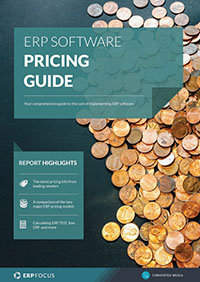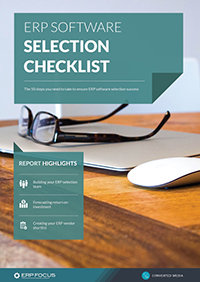Top apparel ERP systems for your software shortlist
As an apparel manufacturer, finding the best solution to manage your processes, from design through to shipping, is crucial for success. An apparel manufacturing ERP software system seems like the obvious choice—one designed specifically for businesses like yours. With numerous options available, selecting the right ERP can feel overwhelming. In this article, we’ll highlight the top ERP solutions for the apparel industry and help you make an informed decision.
What to consider in apparel ERP software
When evaluating apparel manufacturing ERP software, it’s important to focus on what modules and functionality the system offers. Can it handle:
- Material procurement and vendor management?
- Tracking materials by both color and product codes?
- Supplier relationships, including reordering stock based on predicted demand?
- Complex workflows for seasonal production, multi-pattern handling, and managing bulk orders?
The apparel industry is unique, requiring manufacturers to balance constantly changing trends, varying sizes, and complex global distribution. Your ERP system should be able to manage this complexity while improving efficiency and reducing costs.
What is apparel ERP software?
Apparel ERP software is a specialized system designed to manage every aspect of clothing manufacturing, from material sourcing and production planning to distribution. It consolidates all business operations into one centralized system, making it easier to streamline workflows, track inventory, and ensure timely delivery.
ERP systems tailored to the apparel industry can also help manufacturers handle:
- Multiple seasons with fluctuating demand.
- Design management, ensuring consistency across different product lines.
- Supply chain optimization, allowing businesses to reduce lead times and costs.
Which ERP software is used in the garment industry?
Lots of apparel manufacturers use ERP to manage their production processes, from initial design to distribution. While general ERP solutions exist, many garment manufacturers choose systems like FDM4, Infor Fashion and Apparel Connect, which are built specifically for the unique needs of the fashion industry.
However, general process manufacturing ERP software can also be a strong choice for manufacturers with complex supply chains or high-volume production needs. For instance, protected flow manufacturing approaches can help mitigate delays and improve resource allocation.
ERP solutions for the apparel industry
ERP systems are vital for the apparel industry to manage everything from garment production to shipping and distribution. Here's a look at six of the leading ERP platforms currently used in the fashion industry:
Check out our top 10 apparel ERP software white paper to find the best ERP for the fashion industry
1. FDM4
This fully integrated system allows apparel manufacturers to work smarter, faster and more efficiently in the global marketplace. Designed specifically by fashion industry users, FDM4 manages purchasing, inventory, customer orders, sales fulfillment, billing and financial reporting.
Key features:
- Inventory management tailored for fashion companies.
- Multi-channel sales and distribution capabilities.
- End-to-end supply chain visibility for better decision-making.
Case study: Alphabroder, one of the largest promotional apparel distributors in North America, relies on FDM4 to process over 40,000 orders per day. After upgrading to FDM4's latest OpenEdge-based ERP, the company achieved significant operational efficiencies, including improvements in data processing and customer service performance. The system has been key in maintaining a 99.99% uptime, critical for meeting the time-sensitive needs of their customers.
2. INFOR Fashion
Infor Fashion
offers end-to-end resource management tailored to the fashion industry. The system is highly configurable and covers the entire process chain—from design and materials sourcing to manufacturing and retail distribution.
Key features:
- Design and production process management.
- Private brand wholesale and retail functionalities.
- Global sourcing and real-time inventory tracking.
Updates: The latest updates to Infor Fashion include AI-driven analytics to predict fashion trends and help businesses adjust production based on demand
Compare more fashion and apparel ERPs with this free online comparison tool
3. Apparel Connect
Apparel Connect ERP defines itself as a "complete garment manufacturing system." Developed by garment manufacturers, it supports global buying houses with its advanced features for product development, order management, and production planning.
Key features:
- Detailed product development tools.
- Comprehensive order management and WIP processing.
- Advanced demand-based BOM and inventory control.
Use cases: Vimal Clothing in Durban experienced significant improvements in efficiency, cost control, and productivity after adopting ApparelConnect. The unlimited license model proved cost-effective, leading to company-wide implementation, according to Managing Director Nayan Kalidas. The product brochure suggests business can cut their purchases by 3% and dispatch over 2 million garments annually upon implementation
4. A2000
With over 25 years of experience, A2000 is one of the most trusted ERP systems for the fashion industry. This system offers PLM, advanced warehouse management and integrated financial reporting tailored to the apparel sector.
Key features:
- PLM processing for product lifecycle management.
- Advanced inventory control.
- Modules for telemarketing and catalogs, helping businesses reach more customers.
Use cases: A2000 ERP is trusted by over 500 leading brands in the apparel, footwear and home goods sectors for effective operations management. It offers an all-in-one package that simplifies enterprise resource planning, streamlining processes to enhance efficiency and maintain a competitive market edge.
5. PolyPM
PolyPM is an integrated ERP and PLM system designed specifically for the apparel industry. The system manages the entire production process from style development to global distribution.
Key features:
- Integrated PLM and ERP modules for seamless operation.
- Unique features like cut planning and fabric inspection.
- Two-dimensional size ranging, crucial for fashion companies managing diverse product lines.
Use cases: PolyPM is widely used by apparel manufacturers and textile companies to integrate ERP and PLM systems, streamlining operations from product development through production and distribution.
6. Aptean Apparel ERP
Aptean's apparel ERP is a specialized solution that caters to the needs of apparel, footwear, and fashion manufacturers. It includes tools for managing everything from design to distribution, with a particular focus on speed and agility in the production process.
Key features:
- Agile production planning for fast-changing trends.
- Robust BI reporting for better decision-making.
- Advanced supply chain and inventory management.
Case study: REBEL8, a streetwear brand founded in 2003, faced challenges as it expanded globally, including inefficient manual warehouse operations, limited inventory visibility, and unreliable EDI compliance. To solve these issues, CEO Josh Draper implemented Aptean Apparel ERP.
With Aptean, REBEL8 gained real-time inventory visibility, automated UPC generation, and ensured EDI compliance, allowing efficient scaling. The ERP system provided the business with critical sales and financial insights, boosting profitability and ensuring growth.
Process Manufacturing ERP for apparel
While most apparel manufacturers choose fashion-specific ERP solutions, some large-scale manufacturers might benefit from process manufacturing ERP systems. These platforms are designed for businesses that deal with high-volume production, complex supply chains, or integrated processes.
Examples of process manufacturing ERP solutions for apparel:
- SAP S/4HANA: Known for its scalability, SAP is ideal for large-scale apparel companies needing extensive supply chain integration.
- Microsoft Dynamics 365: Microsoft's offering provides flexibility with modules for finance, operations, and customer management, tailored to various industries, including apparel.
Process manufacturing ERPs allow manufacturers to manage multi-level BOMs, track materials across multiple facilities, and ensure compliance with industry regulations. Protected flow manufacturing techniques, which reduce production bottlenecks, are often incorporated into these systems.
Conclusion
Selecting the right ERP system for your apparel business can significantly influence both daily operations and long-term growth. Each platform we've discussed offers industry-specific tools designed to address the unique challenges of the fashion and garment sectors.
As you assess your options, it's essential to prioritize the features that align with your specific business goals and operational complexities, ensuring the ERP system you choose provides not only immediate benefits but also supports your future expansion and adaptation.
Why not start building your own shortlist of apparel ERP systems? Need help finding your best-fit software partner? Simplify your ERP selection with free, personalized recommendations from independent software experts.
Free white paper

Top 10 Apparel ERP Systems
Compare the best apparel ERP systems






